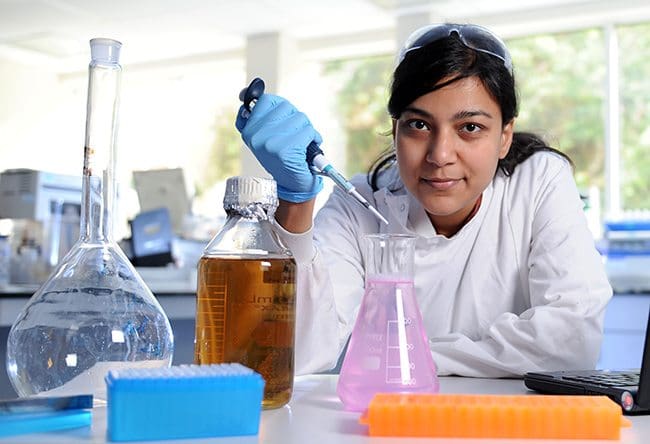The new fully-funded studentships, subject to contractual agreements, will power innovative research in the financial and professional services, advanced materials and manufacturing, creative industries and ICT sectors.
This announcement, part of HPC Wales’ collaboration with Fujitsu, takes the total number of funded studentships to 20, and is a critical part of the wider strategic collaboration between HPC Wales and Fujitsu.
The collaboration, promoting the uptake of high performance computing (HPC) in the Welsh Government’s priority sectors, provides the opportunity for pioneering research projects to take place, which would not have been possible in Wales before.
Such research is being conducted by Farzana Rahman, who was born in Bangladesh, and is now studying for a fully-funded PhD at the University of South Wales.
Farzana is using supercomputing technology to develop a model that predicts how harmless bacteria develops into deadly strains such as E Coli 0157, which can result in kidney failure in children.
With the recent rise in drug resistant infections, such as MRSA and tuberculosis, Farzana’s research is aiming to predict from an early stage whether there is a risk that existing bacteria, such as that present in an open wound, could develop into lethal forms of the substance. It is clear to see these studentships are pioneering potentially life-changing discoveries.
Speaking about the course 27-year-old, Farzana Rahman, said: “I feel honoured to have been awarded the studentship for my PhD. It’s worrying how so many modern infections are adapting to the drugs available to treat them with. The research I am carrying out is hopefully going a long way to reverse this trend.
“While scientists are accessing many avenues to solve this issue, we are taking a rather different approach. I am using supercomputers to create a model that can predict whether present bacteria will develop into dangerous forms; I can then prescribe the correct treatments to avoid this happening.
“If my research is successful, it will be instrumental in supporting doctors, clinicians and relevant bodies in prescribing relevant treatments for patients.”
Part-funded by the European Regional Development Fund through the Welsh Government, HPC Wales is committed to boosting the Welsh economy by providing academic researchers and businesses with some of the most advanced computing technology in the world.
David Craddock, Chief Executive Officer of HPC Wales, said: “We’re delighted to announce that our inward investment total has reached £2 million, as we are committed to ensuring that Wales is leading the way in terms of world class research and innovation projects.
“Supercomputing has the ability to power research projects with extremely large datasets, such as Farzana’s, that simply would not be possible without the advanced technology.
“With the use of high performance computing, researchers are able to analyse large amounts of data at a speed previously unavailable. By facilitating close collaboration between universities and businesses, these projects look set to strengthen and support the growth of a number of key areas of the Welsh knowledge economy.”


